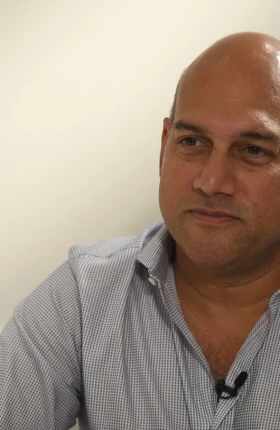Careem has built a reputation as a major innovator in the Middle East. What began with a handful of drivers and a small fleet of vehicles in 2012, is now a wholly-owned subsidiary of Uber Technologies operating in more than 100 cities in 14 countries throughout the Middle East. Known as the region’s super app, Careem lives by its slogan—everyday life, made simple—providing citizens with a host of daily services from rides, shopping, and food delivery, to making payments and more. Careem also supports thousands of refugee families with daily essentials and has joined forces with several impact partners, including the Disabled Children’s Association, ShareTheMeal, and the UN Refugee Agency.
In this interview with Gheed El Makkaoui, we talk about the company’s long-term vision, the impact of COVID on that vision, and the importance of several forward-looking market trends, among other topics.
Innovation Talks with BCG Middle East
Innovation Talks focuses on consumer and industry trends, highlighting the ways in which digital and innovative companies tackle their most ominous challenges, and what they have to offer their local customers.
Our featured guests discuss how digital is enabling new business models and innovations that do not yet exist in our region—but will soon—and offer advice to young entrepreneurs who want to learn more about setting-up and growing startups in Middle East.
The impact of COVID on businesses is an important part of the debate as it has changed consumer trends and introduced new ways of working that are re-shaping their culture.
In our first round of Innovation Talks, we interview three leaders. Tarek Kabrit is co-founder and CEO of Seez, an innovative app to search, buy, and deliver cars throughout the region—UAE, Saudi Arabia, Kuwait, Pakistan, and South Africa. Gheed El Makkaoui, is the country GM of Careem, a one-stop hassle-free app designed to meet the needs of everyday life—from rides and ordering food to shopping and paying. Finally, Ambareen Musa, CEO of Sougalmal, joins Innovation Talks to discuss her financial products comparison site—offering an end-to-end process to apply for loans, credit cards, bank accounts, and insurance. The company was named #2 startup of the year by Forbes ME.
Thank you for joining us. We hope you find our Innovation Talks to be substantive, well-informed, and thoroughly enjoyable.
How is COVID affecting UAE consumers and thereby Careem’s business?
As COVID ramped up in March, online grocery delivery became the new norm for many UAE consumers, particularly those at risk for the virus and others who simply enjoyed the convenience. We believe this trend is here to stay. And as more consumers have taken up more cautious behaviors in their daily lives, we've seen heavy adoption of contactless delivery for all purchases. There is also a new appreciation for safety, which is why Careem now offers insurance with every trip. And, in cases of emergency, we have a 24/7 in-ride call center and an in-car alert button, which will soon be available everywhere we operate.
What is your perspective on mobility and everyday convenience platforms in the next 10 years?
Technology is propelling many new forms of transportation. Whether micro-mobility, mass-mobility, or eco-mobility, all are designed to support people in getting around more efficiently, affordably, and sustainably. In the coming years, we will need regulations to address these new forms of travel and a healthy balance between the supply and demand of these services. From a “Mobility of Things” perspective, we see massive opportunities for innovation and growth. Look at food delivery—which is valued at more than US$110 billion this year alone—the market could reach US$150 billion by 2023 (based on CAGR estimates since 2019). The next few years will reveal ways to reduce costs, make deliveries more affordable, and increase efficiencies.
What do you consider the main opportunities and obstacles in your industry?
There are endless opportunities for innovation, from offering customer convenience, to further raising the bar in terms of partner and merchant experiences, to simply improving efficiencies. However, the potential obstacles are also endless. We must develop the resources, talent, and structures that allow us to foster innovation throughout the organization. In this way, we gain speed, agility, and flexibility in addressing rapidly changing market needs. Also vital is for investors—whether large organizations or small startups—to think ahead and plan for the next-generation of innovations and then design their strategies and visions accordingly. We also need governments and regulations that foster and support innovations in the private sector while ensuring that markets continue to be competitive and healthy.
How would you compare your business pre-COVID, during COVID, and post-COVID?
Careem's core focus pre-COVID was to transition from a ride-hailing platform to a super app. The pandemic accelerated our ability to make this transition, as we ramped up our delivery services to address a huge movement toward online channels that provide groceries and everyday needs. These needs went up 300% in volume and up 500% in value during COVID. Today, more than 25% of the UAE retail industry is now online, a percentage that was in the single digits just a year ago. Also, during COVID, we took over the region’s Uber Eats business, focusing on food delivery, and built on our shop service to enter the daily essentials and specialty shops delivery services. We also expanded our courier service to include shopping on behalf of customers. Our focus has definitely shifted to deliveries, which will continue post-COVID in line with our original strategy.
Were you planning to launch other products or services before the pandemic, and then shifted to meet new market needs?
Our strategy of shifting platforms and getting into these verticals was always part of our long-term plan. The pandemic simply sped up the plan. We've had to cross-utilize multiple resources and re-shift our focus to ensure we maintain convenience for our customers. We continue to look at a variety of services that could address our customers’ daily needs, which will hopefully come in the future. Customer "relevance" will be key as restrictions loosen and ride-hailing services begin to look more toward the future.
How have Careem operations changed or evolved?
Careem was among the first organizations to fully shift to a 100 percent work-from-home model. We are strong believers in technology and are reassessing the need for office space and the best ways to work together. That said, productivity actually improved during these times. Therefore, we have given our employees the option to work from home on a permanent basis.
Are there other key learnings or “takeaways” from the crisis?
Agility is among the key learnings from this pandemic, including how quickly we can repurpose our resources and shift direction.
We discovered the importance of agility. If we think of our entrepreneurial roots, we must be able to act quickly, as mentioned earlier, to remain relevant in the market, and to operate internally in a very flexible way. Agility is among the key learnings from this pandemic, including how quickly we can repurpose our resources and shift direction.
Speaking of the future, what are Careem’s imminent plans in the region?
We will continue building a platform that is relevant to our customers’ day-to-day lives. As consumer behaviors shift, often on a daily basis, our growth path consists of exploring different ways to remain top-of-mind—whether through payment services, delivery services, or alternative daily-use cases. And of course, mobility will remain the core of our business. This includes new forms of mobility such as the bike-sharing concept recently launched in the UAE. So, there are lots of exciting plans in our future.
If you were to offer advice to young entrepreneurs, what would it be?
In my experience, the top entrepreneurs always start with a problem that needs a solution. Those who tend not to succeed are those who come up with new ideas or innovations that do not speak to what consumers need or want. My best advice to aspiring entrepreneurs is to begin with a problem statement, build in short-term value to drive early growth, and then turn that growth into longer term value that can drive revenues. It’s important to have both a short-term focus and a long-term vision—both are essential to creating a successful, sustainable business.





